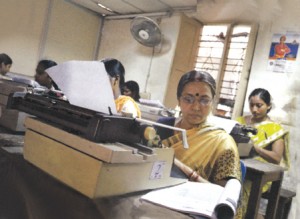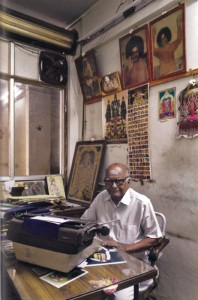Registered with the Registrar of Newspapers for India under R.N.I 53640/91
Vol. XXVI No. 21, February 16-28, 2017
The South Indian typist
By Vikram Doctor
The power in an office
(Continued from last fortnight)
From ministers in Delhi to Marwari businessmen in Calcutta to senior counsels in Mumbai, their offices were guarded by south Indian steno-typists turned personal assistants (PAs), as assiduously as they might be the inner sanctums of temples. Tandon realised their power once he became chairman of Unilever India. As was imperative in those Licence-Raj days, he had to spend much time doing rounds of the Delhi ministries. As soon as he reached Delhi, he recalled, his manager would debrief him on the latest intelligence regarding their file: “Rama-chandran, his personal -assistant, had his antennae out and had learned from ‘Ramaswamy’, the personal assistant of a minister’s secretary, that according to the information he had received from ‘Ramadurai’, the personal assistant of the secretary in another ministry, that was where the file was now taking rest”. The cartoonist, Mario Miranda, would give the south Indian steno–typist-PA visual form in Moonswamy, PA to the politician Shri Bundaldass.
Not all south Indian typists were Brahmin, of course. In Kerala, for example, the trend towards taking typing-related jobs cut across communities, so much so that Shashi Tharoor noted in India: From Midnight to the Millennium and Beyond (1997), the joke was that “so many Keralite typists flocked to stenographic work in Bombay, Calcutta and Delhi that ‘Remington’ became the name of a new Malayali subcaste”. Even Malayalis who went to the Gulf would send back pictures of themselves posing with typewriters to prove that they had office jobs, rather than the reality of construction sites (noted in Caroline Osella and Filippo Osella, Men and Masculinities in South India, 2006).
Given this use of typewriters to convey status, it should come as no surprise that the Stenographer’s Guild has adapted to today’s requirements for status. Dr. Sekar explains that the Ministry of Labour gives SC/ST candidates Rs 500 a month for 11 months, to learn stenography and typing. “All of them get 100 per cent job placements after that,” he says. The Guild is allowed 100 students under this scheme-it is evidently a sought after source of steady revenue for the few -remaining typing institutes. The skills of these students will presumably be exercised on computers, to which most steno-typists transitioned easily (as compared to their bosses, most of whom still remain unsure of the Internet, simply because they are not used to typing), but it is notable that the means of professional entry remains a typewriter.
Not long after he retired, I met Shetty in my office again. He had come to clear up some personal paperwork, and we started talking about typewriters. Suddenly he stopped. “I have to show you something;’ he said with a surreptitious smile. He took me to a bank of cupboards in one corner of the office and started rummaging in their depth: “It was here somewhere … where is it now … I hope they didn’t get rid of it … “ Finally, he found what he was looking for, tucked away behind a stash of printer cartridges-a Godrej Prima typewriter in near perfect condition, down to the ribbon tucked in for use.
“When the office started replacing its typewriters, I kept this one;’ Shetty told me. “It was useful sometimes for typing legal documents that were hard to print from the printer. And I also thought if there was ever a bad power failure, it might be useful.” But after a while he prudently decided it was best to keep the machine out of sight, well away from all implacably modernising forces, especially when he would no longer be there to defend it. Now, Shetty lovingly brushed the keys and tweaked the ribbon: You can use it straightaway,” he said. Then he picked it up, bent and carefully concealed it again, saying, “An office should have a typewriter.”
A help with the computer
l Mrs. Vatsala Krishnakumar interviewed at The -Stenographers’ Guild.
Swapna Siva Kumar, 25, has just started out on a career as a Chartered Accountant in Chennai. She doesn’t like her mother, Mrs. Vatsala Krishna Kumar, a housewife, to sit idle and so it was decided that the mother would lend a hand and help out with her daughter’s work. “She has a lot of work of typing things into her computer and so I decided that I could help her out with that -sometimes,” says Vatsala, 50, who has recently enrolled for typing lessons at The Stenographers’ Guild in Chennai.

After completing her BSc and finding a lot of time on her hand, Mrs. Kumar had learnt typing and shorthand “because that was what everyone did in those days”. But that was nearly three -decades ago and since her daughter now cannot spend enough time to teach and oversee her, she felt it was best if she joined classes for regular lessons and to refresh her skills. “I am discovering now that I lack speed. I have forgotten the fingering. Certain fingers are still difficult for me. For ‘A’ we have to use this finger,” she says showing the little finger on her left hand. “I am finding that now it is no longer as flexible as before,” she says with an embarrassed smile.
Vatsala has also enrolled for the computer courses offered by the Stenographer’s Guild. “I am learning the basics – MS Word, Excel sheets, sending email…,” she says. I ask her whether having the skill to work a typewriter improved her speed on the computer keyboard as has been regularly told to me by typing instructors. She mulls over this for very long. “The computer is easier. On the typewriter you can’t afford to make mistakes and so I am more careful…on the computer, I think my mind wanders a bit,” she says thoughtfully.

For limited use
S.K. Balasubramanian interviewed at ESKEBY & CO.
The room is poorly lit with two of the three tubelights lighting up as per their whims. Even the chairs protest their use by creaking when one shifts even slightly. It would seem that technology does not have it so good here. In the tiny office of Eskeby & Company, one of Chennai’s wholesale paper merchants, sits a Facit typewriter which looks as though it has almost been forgotten. We talk about the typewriter. “I use it perhaps to type two or three letters per month… to reply to correspondence concerning my quotations,” says S.K. Balasubramanian, the octogenarian proprietor of the firm, about his 20-year old Facit. “My business, unlike the others in this market, is not a daily business … I deal in bulk… with universities and government agencies like the Southern railways,” he justifies not having a computer in his office. “I have a computer at home and I use it for the internet and spend time on Facebook. This typewriter I have simply kept,” he says. “It is very old, you see, and gives trouble from time to time. Sometimes the ribbon gets stuck. Sometime something else will be wrong. Then I call the repairer and if he has to change the ribbon then I give him 20 or 50 rupees or so and he goes away. But I have decided I will never spend more money than that, say 700 or 800 rupees on any major overhaul,” he says. “For me the machine has absolutely no use,” he says dramatically as he digresses once again lapsing into another monologue about life and death.

